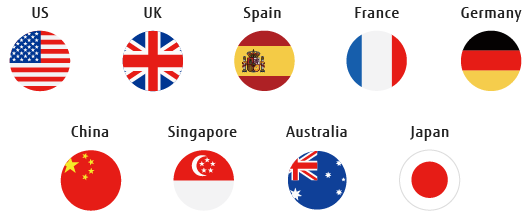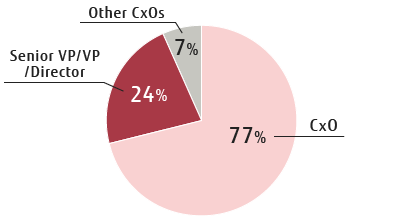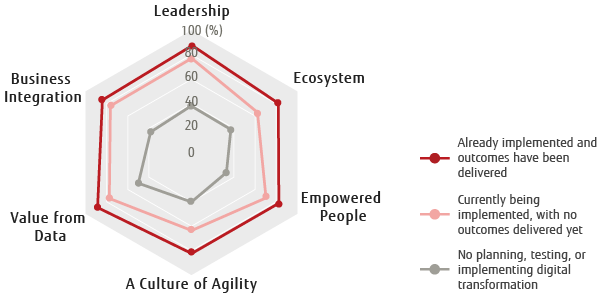Building Trust to Successfully Drive Digital Transformation
Fujitsu Surveys Business Leaders across 9 Countries on the Status of Digital Transformation
We are living in a world that is more connected, more globally integrated and faster paced than it has ever been. The benefits that have been brought by digital technology seem obvious and ubiquitous. But the world is increasingly becoming chaotic.
In today’s complex world, trust has become a big challenge. Rebuilding trust is the central issue to create a better future.

In February 2019, Fujitsu conducted a survey to understand their progress in digital transformation and to clarify how business leaders around the world perceive “trust”, an important theme in recent years.
900 business leaders in 9 countries

Profile

Progress of Digital Transformation
87% of the respondents answered that they have planned, tested, or implemented digital transformation in the last three years. By industry, financial services and transportation companies are the most advanced, with 47% of financial services companies and 45% of transportation companies have implemented and delivered outcomes.
Started digital transformation
Across all industries

87%
Implemented digital transformation and delivered outcomes
Financial Services

47%
Transportation

45%
Success Factors of Digital Transformation
Last year’s survey conducted by Fujitsu revealed that six organizational capabilities are important to deliver positive outcomes in digital transformation. Analysis of this year’s survey also reveals that successful companies have such organizational capabilities, we call these digital muscles.
Digital maturity
The numbers in the chart are % of companies which responded they had capability in each of the 6 success factors

Assessment of Individual Trust in Digital Society
Digitalization has generally enabled wider and easier communication, however respondents felt it is difficult to judge if online information is correct or trustworthy. On the other hand, from the view point of an organization, 69% of respondents agreed the effectiveness of using social media postings and online presence — including purchasing histories, to determine individual trustworthiness. From the view point of an individual, 56% of the respondents fully accept or accept in some circumstances that they may be assessed on their online presence.
Organizations found it effective to use individual online presence to assess someone’s trustworthiness

69%
Individuals accept they may be assessed on their online presence

56%
Do You Trust Decisions Made by AI or by a Person?
Respondents tend to trust decisions made by AI more in situations where the human impact is less.
| Quality inspection of a product | Judging or refereeing decision in sport | Medical diagnosis | Court decision | |
|---|---|---|---|---|
| I would have greater trust in AI than a person to make this decision | 22% | 22% | 13% | 9% |
| I would not trust AI to make this decision | 10% | 14% | 21% | 27% |
| I would have greater trust in AI than a person to make this decision | I would not trust AI to make this decision | |
|---|---|---|
| Quality inspection of a product | 22% | 10% |
| Judging or refereeing decision in sport | 22% | 14% |
| Medical diagnosis | 13% | 21% |
| Court decision | 9% | 27% |
Importance of Human Empowerment
Many business leaders have been aware of the importance of empowering people. Moreover, companies that recognize the importance of these factors seem to have greater success in digital transformation.
Believe having a good work-life balance is important

78%
Believe diversity is important

74%
Believe inclusiveness is important

72%
To discover further information, please see the Global Digital Transformation Survey Report 2019.




